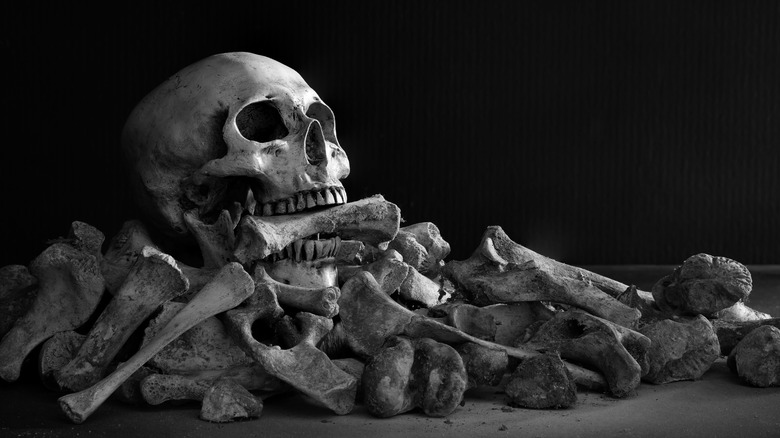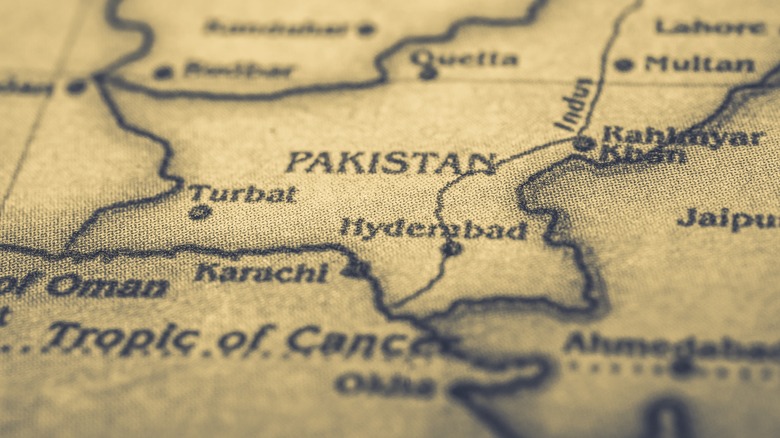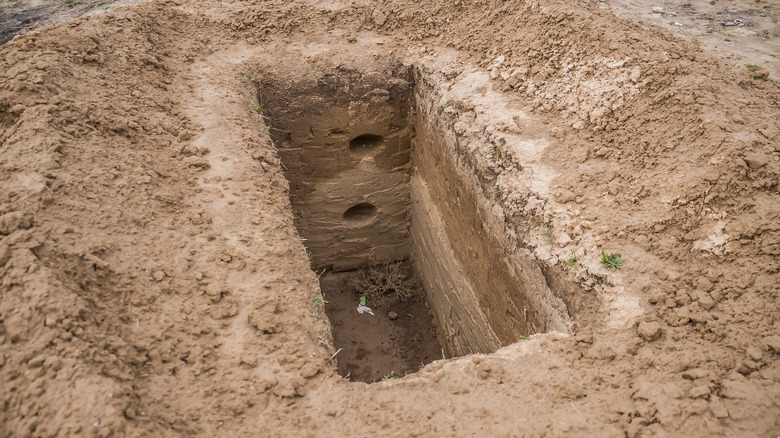Why Did A Pair Of Brother Cannibals Once Receive Only A 2-Year Prison Sentence?
From time to time, someone will commit a heinous crime, only for the judicial apparatus to find out that what they did wasn't technically illegal, and options for prosecuting the criminal are limited. For example, a Massachusetts woman named Michelle Carter convinced her friend to kill himself, literally telling him to go through with his plan ever after he'd thought better of it and tried to stop. There was no law at the time, however, that made talking someone into committing suicide a crime, and so authorities could only charge her with involuntary manslaughter (via Investigation Discovery). That's about all authorities can do in these cases — charge the actor with an adjacent crime and then tighten up the law books later.
In Pakistan, authorities learned about these gaps in the law books the hard way when two men — brothers — were found to have cannibalized human remains. Unfortunately, Pakistan didn't have a law on the books at the time against this thing, so they were convicted of desecrating a dead body and served a relatively brief two years in prison (via CNN). Then, 12 years later, they did it again.
Brothers Muhammad Arif Ali and Farman Ali
Back in 2011, as The Guardian reported at the time, the family of a 24-year-old woman, Saira Parveen, died of cancer and was buried. The next day, the family returned to her gravesite, only to find that the grave had been dug up and the body removed.
It didn't take long for authorities to come up with a pair of suspects. Police official Malik Abdul Rehman told the newspaper that brothers Mohammad Farman Ali and Mohammad Arif Ali had been eating the flesh of the dead for a year by that point, although rumor had it that they had actually been cannibalizing corpses for a decade. Either way, they had certainly cannibalized Saira Parveen — authorities found digging equipment, as well as parts of a meal that they'd made out of her flesh, there in the brothers' home. "They boiled the flesh first, then cooked it in a curry," said Rehman. Police also found another cannibalized body, that of a 4-year-old girl, that had also been removed from an area graveyard.
No Law Against Cannibalism In Pakistan
When legislators sit down to write laws, they can't possibly be expected to think of everything. In Mississippi, apparently no one ever considered the idea that someone would try to sell their grandchild for $2,000 and a car, but when someone did exactly that, there was no crime they could charge the perpetrator with.
Pakistan had no law on the books against cannibalism at the time, likely because, as The Guardian writer Saeed Shah writes, it's "so unusual" that no one ever got around to criminalizing it. Yet when there was indisputable evidence that the Ali brothers were digging up and cannibalizing corpses, authorities found no law forbidding cannibalism. Instead, officials charged the brothers with digging up a desecrating a grave, for which the penalty was only six months, according to The Guardian. A later BBC News report would say that both men served around two years for these crimes.
Years In Obscurity
After getting out of prison for their first (known) act of cannibalism, the Ali brothers now found that their reputation was going to be difficult to live down. According to BBC News, after their release from prison, they found themselves pariahs in their village of Khwawar Kalan, and it appears they skipped town and decided to keep a low profile.
In August 2013, BBC News reporter Mohammad Ilyas Khan caught up with the brothers through herculean effort. Eventually, the reporter found a relative of the man, who greeted Khan with hostility. "Interview the corpse-eaters? They didn't eat corpses. They are just the victims of their neighbours' jealousy," the relative said. A bit later, the reporter managed to find Mohammed Arif, living in squalor, afraid to answer the reporter's questions. He did manage to intimate that he hoped nothing like his previous incident would ever happen again. "Everything will be alright ... God willing," he said at the time.
How Did We Get Here?
America's best-known brushes with cannibalism occurred within the context of desperation and starvation (the Donner Party) and within the context of homicidal psychopathy (Jeffrey Dahmer). The Ali brothers are not known to have murdered anyone — they dug up the graves of those who were already dead — but interviews with people who knew them seem to suggest that their mental states are in question.
According to BBC News, a police inspector found that both men had been married, but that they beat their wives, imprisoned them, and didn't work. They also had a developmentally disabled sister who was found drowned in a canal, although whether or not the men had anything to do with that remains unclear. A police inspector later inspected rumors that the men had contacted a sorcerer who also ate human flesh. Mohammad Farman Ali later admitted that he put a curse on his neighbors and that he needed to eat human flesh to sustain the curse.
However, via The Guardian, police official Malik Abdul Rehman offered a more straightforward explanation: He said that after the men's mother died and their wives left them, they took up cannibalism as an act of revenge, and it "became an addiction" for them.
They Did It Again
As mentioned previously, a local police inspector believed that the Ali brothers were addicted to eating human flesh. It certainly seems that they weren't able to stay on the wagon particularly long; in April 2014, just a few years after their release from prison for their first (known) acts of cannibalism, the brothers were arrested for the same crime again. This time, their crime was even more gruesome: As CNN reports, the victim of their cannibalism was not an adult woman, but an infant. Further still, the smell was so bad that the neighbors took an interest.
In fact, according to BBC News, it was that smell that allowed the government to pin additional charges on the men. Specifically, because of the smell and the fear it instilled in the neighbors, authorities were able to charge them with spreading fear and damaging property, both under Pakistan's anti-terrorism laws. At the time, however, Pakistan still hadn't made cannibalism a crime. This time, they were both sentenced to 12 years in prison.





